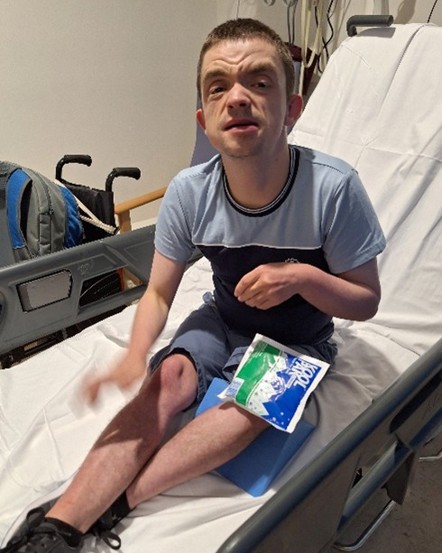Life with a Partially Verbal Child

Jennifer Arnold
I’m passionate about raising awareness about disability issues through education and outreach. When I’m not wearing my writer hat, I’m usually trying ...
If I answered honestly, it would read something like, “She can say a few words, but she is really hard to understand due to scarring on her vocal chords and craniofacial issues which make it hard for her to make certain sounds.
She also has a hard time with open-ended questions due to her Autism and Intellectual Disability, but she can understand most everything you say to her and does pretty well with “yes” or “no” questions.”
Instead, I write, “Partially verbal” because it’s more accurate, less complicated, and it fits better in the miniscule space they usually give to write your answers.
Despite her lack of ability to verbalize effectively, it feels like I am betraying her if I write that she is “non-verbal” because it doesn’t do her justice.
She didn’t speak her first word until she was four years old.
Before that, grunts, screams and gestures were her preferred methods of communication until she started speech therapy.Even now, saying a sentence with more than three words is impossible for her, but she tries so hard.
Living with a verbally challenged child, whether they are completely non-verbal or partially verbal is challenging to say the least.
My husband, myself, and our other children sometimes feel like detectives, trying to unravel clues when Lilly is trying to communicate something we can’t quite understand.
As she has gotten older communication has gotten a bit easier; technology has helped a great deal.
Type to speak apps and apps with picture icon sequencing have made the communication gap a little less frustrating, but when she is in the middle of a meltdown, even those don’t help much.
In fact, if we try and prompt her to use her tablet when she is extremely agitated, the tablet will likely go flying (thank goodness for hard rubber cases).
In addition to the inability to communicate her needs when she is really upset, she is unable to verbalize vital information successfully.
These are the, “What if..?” scenarios that keep me up at night.
Unless you know her, and are used to the way she speaks, it is hard to understand her if she tells you her name, or even her age if she were to ever get separated from us.She would unable to converse with first responders if there was ever an emergency situation.
She won’t tell us when she’s hurt. I noticed her limping one day and found a small cut on the bottom of her foot.
I still don’t know how she got it, but if I hadn’t found it, she never would have told me on her own.
As I cleaned off her foot and bandaged it, I tried not to let the “what if” thoughts spiral out of control, because that is a slippery slope.
She’s entering into those preteen years where she is craving some independence.
As much as she deserves that, and as much as I’d love to give it to her, I can’t; for her safety and my own sanity.Due to the lack of judgement that comes along with the intellectual disability, and the lack of ability to communicate effectively in times of stress, she is always going to need some type of supervision.
One of the most challenging things for me has been going from being her voice to being her translator.
When she was younger, I would automatically answer any questions directed at her, or about her. In the last year or so, she began to get irritated when I would do this, so now I wait for her to answer and try and fill in the gaps when I can.
It’s definitely a process, because as a mom, my first instinct is to jump right in and now I’ve got to pull back.
No matter what the future holds, and I have no doubt there will be struggles, I will never stop encouraging and empowering my daughter to express herself and have a voice.


